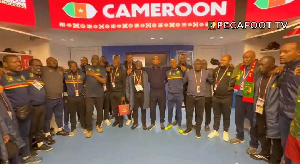Awardees of the 4th edition of the investigative journalism prize award ceremony organised in Yaounde recently, have said that being an investigative journalist in Cameroon is synonymous to sacrificing oneself on a butcher’s slab to be slaughtered.
The investigative journalism competition was supported by the British High Commission.
The laureates said despite efforts that the British High Commission is making to promote freedom of expression and access to information in Cameroon, the ground still appears unpromising.
“You don’t know who is monitoring you at any moment. The hierarchy you are working for will say,‘ooooooh, you have trampled on the editorial policy. This is not supposed to be done.’
At times the next person becomes a suspect because you don’t know whether the person is behind you and what he is looking for,’’ said Moki Edwin Kindzeka, a CRTV journalist in Yaounde, who won the third prize for his audio story on “Cameroon Human Trafficking to the Middle East’’.
Besides risking one’s life in the course of investigative reporting, sources and access to information seem to have been coded in a language that is not understood by reporters.
Amindeh Blaise Atabong of The Guardian Post Newspaper and winner of the second prize for his print story on “Gendarmes Obstruct Justice on Fako Red Cross Agent”, said, “Imagine one doing a story that has to do with the Secretariat of the National Gendarmerie.
To have audience with the authorities was not easy for me. You know information holding is a serious problem in Cameroon. I had to go to other places to get information.”
The rapporteur of the 2015 AFRICAphonie-Cameroon sponsored investigative journalism competition, Lamtang Jesse Konang, after pointing out the prominence of investigative journalism as a tool of bringing security into the government and society, frowned upon the scrawling practice of society due to the absence of a freedom of information law in the country.
More so, no provisions are made available for the security of investigative journalists who face numerous death threats at each successful accomplishment of their task.
However, the British High Commission’s intention is that through the investigative journalism competition scheme in support of the Ministry of Communication, they will improve the legal framework around freedom of expression and access to information in order to further strengthen democracy in Cameroon, so that freedom of the press does not remain on papers.
Actualités of Wednesday, 6 April 2016
Source: The Post Newspaper













